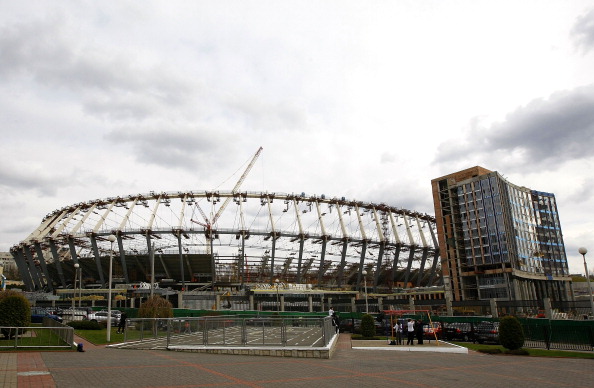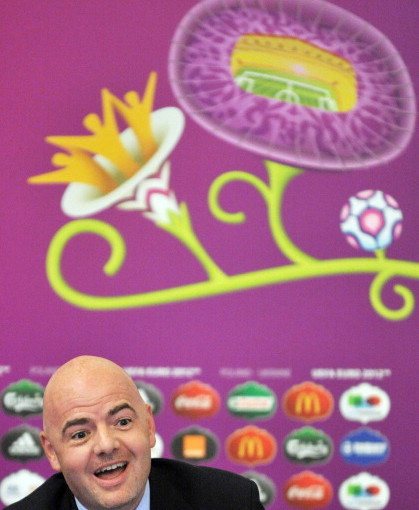By Andrew Warshaw in Kiev
June 7 – Kiev officials went firmly on the defensive as it emerged the venue for the final of next year’s Euro 2012 Championships is lagging well behind schedule.
Twenty-four hours before celebrations in both Ukraine and Poland marking exactly a year before the tournament kicks off, politicians and sports officials in the Ukrainian capital insisted the revamped Olympic Stadium would be ready on time despite the fact that more than 40 per cent of the original structure is still standing with the pitch being used as a virtual storage area.
“Eighteen months ago we all thought that Euro 2012 would be seriously threatened as far as Ukraine is concerned but no-one has any doubts now, “said Grygoriy Surkis, President of the Ukrainian Football Federation.
At a news conference as part of a whistle-stop media tour organised by UEFA, Surkis urged reporters to be patient and let the joint hosts of the first ever major football championship in Eastern Europe do things their way.
“For years we did not have a gateway or window to the rest of the world so give us some understanding,” he said.
UEFA general secretary Gianni Infantino (pictured) admitted the £500 million ($818 million) venue needed to speed up but wouldn’t go so far as to admit it was a major worry.
“Maybe it will be completed later than planned but I’m confident it will be finished by October,” Infantino said in what appeared to be an optimistic assessment as he sat alongside influential local and national sports and political figures.
However, the Ukrainian capital’s anxieties do not only extend to the revamped stadium, where 2,000 workers are employed.
Officials have also confirmed to insideworldfootball that there is no guarantee of a proper rail link between the airport and the city centre come the summer of 2012, with fans quite possibly having to travel into the city by bus.
Borys Kolesnikov, the country’s vice-Prime Minister, insisted that with eight months to go, there is no need for panic, either when it comes to the stadium or transport links.
“There is more than enough time to eliminate the bugs,” he said.

Kiev may be struggling to meet its targets but in Kharkiv close to the Russian border, the picture is far more promising.
“A few years ago, nobody trusted Ukraine but the situation is changing,” said charismatic billionaire businessman Alexandre Yaroslavsky who owns Metalist Kharkiv, Ukraine’s third most established team, and who has pumped £265 million ($433 million) of his own money into the local infrastructure to make sure the city can more than hold its own.
“We have made great progress, look at Kharkiv, and look at Metalist.
“One year ago this was empty land.
“Five years ago, Metalist was in the second division, now we are ready to challenge the top clubs of Europe.
“I haven’t had one minute of rest in four years.”
Much has been made of the wisdom, or otherwise, of awarding Ukraine joint status with Poland.
Even UEFA President Michael Platini has constantly urged the authorities to get a move on in terms of completing stadium and transport infrastructure on time.
At one stage there was even talk of stripping Ukraine of its joint status.
But the message at last seems to be getting across – in most venues at least.
“Every month things have lot a little bit better,” said tournament director Martin Kallen.
“Six months ago a lot of it was still on paper.
“Sure, both countries are still behind in some areas but they are making great strides.”
Meanwhile, Infantino played down an official report in Poland suggesting technical problems, shortages of funds and legal issues would seriously threaten its ability to stage the tournament.
Although preparations had “visibly advanced” according to Poland’s Supreme Audit Office, the scale of delays, abandoned projects and poorly implemented investments “is so significant that it may threaten the smooth running of the tournament.”
Infantino said it was inevitable that the pace of change would throw up the occasional hitch.
“Work which normally takes 20 years is now taking four years,” he said.
“Basically as long as the problems do not impact on the competition, the problems which may arise will not cause us too much bother.”
You can contact the writer of this story at zib.l1744898933labto1744898933ofdlr1744898933owedi1744898933sni@w1744898933ahsra1744898933w.wer1744898933dna1744898933
Related stories
June 2011: Euro 2012 organisers aiming to show world that they will be ready in time
April 2011: Azarov wary of terrorism threat at Euro 2012
April 2011: Ukraine confident of trouble free Euro 2012
April 2011: Report highlights challenge of racist abuse and discrimination in Poland and Ukraine
March 2011: UEFA admit to concerns over hooliganism and infrastructure for Euro 2012 finals

